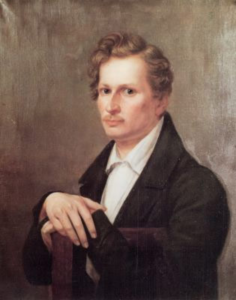You do not love me
(Poet's title: Du liebst mich nicht)
Set by Schubert:
D 756
[July 1822]
Mein Herz ist zerrissen, du liebst mich nicht,
Du ließest mich’s wissen, du liebst mich nicht!
Wiewohl ich dir flehend und werbend erschien,
Und liebebeflissen, du liebst mich nicht!
Du hast es gesprochen, mit Worten gesagt,
Mit allzu gewissen, du liebst mich nicht.
So soll ich die Sterne, so soll ich den Mond,
Die Sonne vermissen? Du liebst mich nicht!
Was blüht mir die Rose? Was blüht der Jasmin?
Was blühn die Narzissen? Du liebst mich nicht.
My heart has been torn apart, you do not love me!
You let me know that you do not love me!
Even though I appeared before you as I begged and implored,
And I was zealous with love, you do not love me!
You spoke it, you said it in words,
You said it with so much conviction, you do not love me!
Should I then miss the stars, should I miss the moon,
Should I miss the sun? You do not love me!
Why is the rose in flower? Why is the jasmine in flower?
Why are the daffodils in flower? You do not love me!
All translations into English that appear on this website, unless otherwise stated, are by Malcolm Wren. You are free to use them on condition that you acknowledge Malcolm Wren as the translator and schubertsong.uk as the source. Unless otherwise stated, the comments and essays that appear after the texts and translations are by Malcolm Wren and are © Copyright.
☙
Themes and images in this text:
Begging and pleading Flowers Hearts Night and the moon Roses and pink Stars The sun
GHAZAL A monorhymed lyric poem . . . common to Arabic, Persian, Turkish, Uzbek, Pashto, and Urdu literature. The rhyme scheme is aa ba ca, etc., and, after the 12th century, the poet mentions his name toward the end of the poem. Classical ghazals share a limited range of images and a fairly restricted vocabulary. The principal subject of the ghazal is earthly or mystical love, and the mood is melancholy, expressing sadness over separation from the beloved. The ghazal took its canonical form in Persian in the 11th - 12th centuries. The most famous of all ghazal poets were the Persians Sa'di (d. 1292), Hafez (d. 1389-90), and Sa'eb (d. 1677-78); and the genre developed in other literatures under strong Persian influence. . . . Translations of Hafez inspired the German romantic poets, especially Goethe, whose West-östliche Divan imitated Persian models. Platen wrote a large number of ghazals. . . . William L. Hanaway, in The New Princeton Encyclopedia of Poetry and Poetics Princeton University Press 1993 pp. 478-9
This text is from Platen’s first published collection of lyrics, Ghaselen (1821). At this point the 25 year old poet was studying Persian language and literature at the University of Erlangen and attempting to recover from his unrequited passion for Eduard Schmitlein (who he referred to as ‘Adrast’ in his diaries). It is not unreasonable to read ‘Du liebst mich nicht’ as both a record of a personal emotional experience and an exercise in Persian poetic form.
The poet has managed to capture both the specificity of the pain and its universality. There can be very few readers who have not gone through a similarly devastating experience. One of the things that is so painful about it is that we are convinced that there was only one specific person whose love could have made us happy. It does not help if people suggest that we will get over it or find someone else. However, reading a poem as raw and direct as Platen’s can remind us that our experience is not unique and that others have known a similar (though not the same) devastation.
The experience is numbing. We DO repeat the crucial words, over and over. The awful moment is re-lived and re-enacted, again and again. All the lights seem to go out and the colours fade. Although the stars, the moon and the sun continue to shine, they do not brighten the spirits of the person who has suffered rejection. Although the flowers blossom, they cannot lift our spirits. The brightness of the sky and the earth can no longer reach us. What is the point of all of that light and colour if you do not love me?
☙
Original Spelling Du liebst mich nicht Mein Herz ist zerrissen, du liebst mich nicht! Du ließest mich's wissen, du liebst mich nicht! Wiewol ich dir flehend und werbend erschien, Und liebebeflissen, du liebst mich nicht! Du hast es gesprochen, mit Worten gesagt, Mit allzugewissen, du liebst mich nicht! So soll ich die Sterne, so soll ich den Mond, Die Sonne vermissen? du liebst mich nicht! Was blüht mir die Rose? was blüht der Jasmin? Was blühn die Narzissen? du liebst mich nicht!
Confirmed by Peter Rastl with Schubert’s source, Ghaselen von August Graf v. Platen Hallermünde. Erlangen Carl Heyder. 1821, page 15 (here as Ghasele no. 9); and with Gesammelte Werke des Grafen August von Platen. In Einem Band. Stuttgart und Tübingen, J. G. Cotta’scher Verlag. 1839, page 71.
To see an early edition of the text, go to page 15 Erstes Bild 19 here: https://download.digitale-sammlungen.de/BOOKS/download.pl?id=bsb10116338


